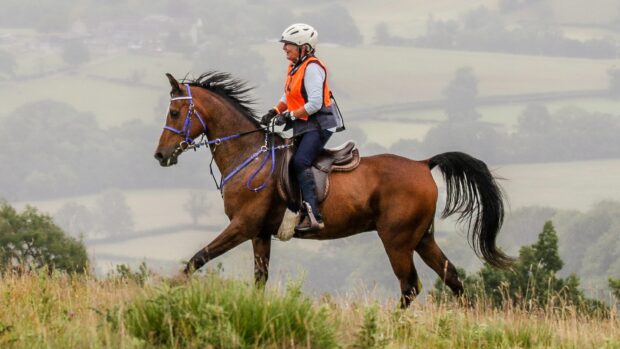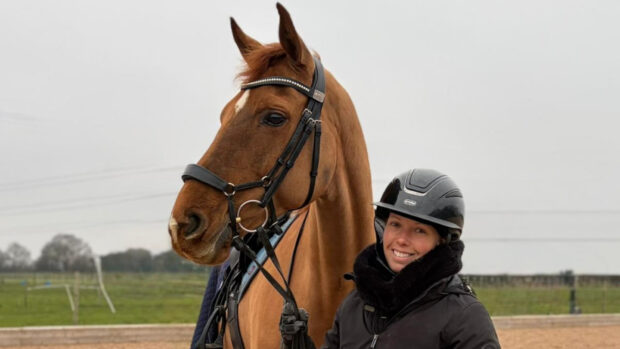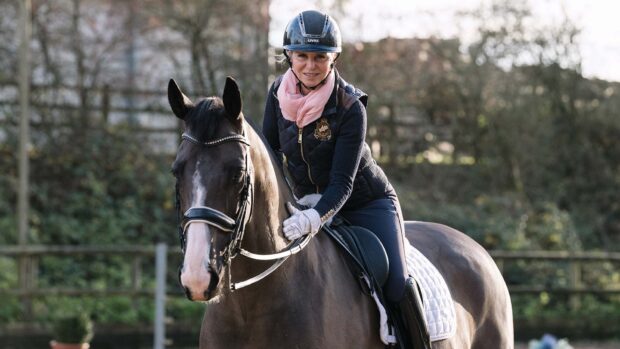West Nile virus has been detected in UK mosquitoes for the first time, a finding the British Equestrian Veterinary Association (BEVA) said is “notable” but the current risk to horses and humans “remains very low”.
The UK Health Security Agency (UKHSA) announced yesterday (21 May) that fragments of West Nile virus genetic material had been identified in mosquitoes collected in Britain for the first time.
The virus is mosquito-borne and can affect birds, humans and horses. No equine or avian cases of West Nile virus reported in the UK have been associated with local transmission. All confirmed equine cases to date have been linked to recent travel abroad.
The majority of infected horses do not show signs. For those that do, signs of West Nile virus typically include muscle tremors, weakness, stiffness, ataxia – wobbly gait – and potentially recumbency. Its effects can range from being relatively mild to fatal.
The British Horse Society (BHS) has further information on the virus on its website and states that once a horse or human has been infected, they cannot pass the virus directly to another. It adds that many horses recover and return to full health, although a small minority of cases report long-term effects such as gait abnormalities. The BHS website also states that the mortality rate for horses which show clinical signs is reported to be between 35%-45%.
The UKHSA said “there is no evidence to suggest ongoing circulation of the virus in birds or mosquitoes in the UK and the risk to the general public is very low”.
How was the virus detected in UK mosquitoes?
The discovery came about through a UKHSA and Animal and Plant Health Agency research programme. Fragments were detected in two samples of Aedes vexans mosquitoes (commonly known as inland floodwater mosquito) from wetlands on the River Idle near Gamston (Retford) in Nottinghamshire, in July 2023.
The mosquitoes were pooled into 200 groups of 10 for testing, and fragments of West Nile virus genetic material were identified in two of the pools. The other 198 were negative.
BEVA board member Prof James Wood, infectious disease epidemiologist and co-director of Cambridge Infectious Diseases at the University of Cambridge, said: “It is very interesting that UKHSA and APHA have published evidence of West Nile virus infection in mosquitoes in England, although it is not especially surprising as it has been known for some time that previously infected migratory bird species have been travelling to and in some cases then spending summers in the UK.
“West Nile virus has become more prominent across Europe over the last 10-20 years. Risk mapping has identified parts of England, in particular in the south, as sites where West Nile virus transmission might be expected. It is not clear whether this finding is simply a new observation of something that has been occurring for years, or a new occurrence.
“APHA has monitored dead birds for West Nile virus for some time, but not detected it and while this surveillance is to be applauded, surveillance in healthy wild birds has never been undertaken.”
Professor Wood added that flaviruses, such as West Nile virus, more generally do not cause disease in their avian hosts.
He said that the natural cycle for transmission for many of these does not involve mammalian hosts. But that spillover into horses and humans, with clinical disease consequences, is a concern for West Nile virus when it does happen.
“Encephalitis is seen occasionally in both humans and horses,” said Professor Wood. “Veterinary and public health authorities have known for some time about the risks of West Nile virus transmitting to humans and horses and this new finding does emphasise the importance of medical and veterinary surveillance in cases of unexplained encephalitis.
“When West Nile virus is known to be circulating locally, enhanced mosquito avoidance approaches (stabling of horses, especially at dawn and dusk in high-risk areas) may be warranted.”
West Nile virus: ‘Currently no cause for alarm’
A BEVA statement said that the presence of the virus in mosquito vectors highlights the importance of continued surveillance, particularly as climate conditions shift.
It added that veterinary practitioners should include West Nile virus in their differential diagnosis for acute neurological presentations, especially in horses with tremors or ataxia, even when travel history is unclear.
“Horse owners travelling to endemic regions with their horses should be advised to consider West Nile virus vaccination, especially during mosquito season,” said the BEVA statement.
“Seasonality may no longer be a reliable predictor of mosquito activity. Climate change has increased the complexity and unpredictability of vector-borne disease patterns.
“While this is the first known detection of West Nile virus in UK mosquitoes, there is currently no cause for alarm.”
BEVA also supports “proactive awareness and preparedness in equine practice”; further details on this are on its website.
“We will continue to monitor any further developments and share relevant updates with our members and the wider equine community,” added the statement.
Meera Chand, UKHSA deputy director for travel health, zoonoses, emerging infections, respiratory and tuberculosis, said: “While this is the first detection of West Nile virus in mosquitoes in the UK so far, it is not unexpected as the virus is already widespread in Europe.
“The risk to the general public is currently assessed as very low. Vector research of this kind is designed to give us early warning of potential threats so that we can enhance our disease surveillance and control activities and ensure patients receive appropriate testing.”
West Nile virus is a notifiable disease, so must by law be reported to Defra in England and Wales, and in Scotland and Northern Ireland to the equivalent government authority.
- To stay up to date with all the breaking news from major shows throughout 2025, subscribe to the Horse & Hound website
You may also be interested in:

‘We’re delighted to bring loyal readers this benefit’: H&H magazine subscribers get free website access

No need for alarm, say top vets, as West Nile virus confirmed in UK




